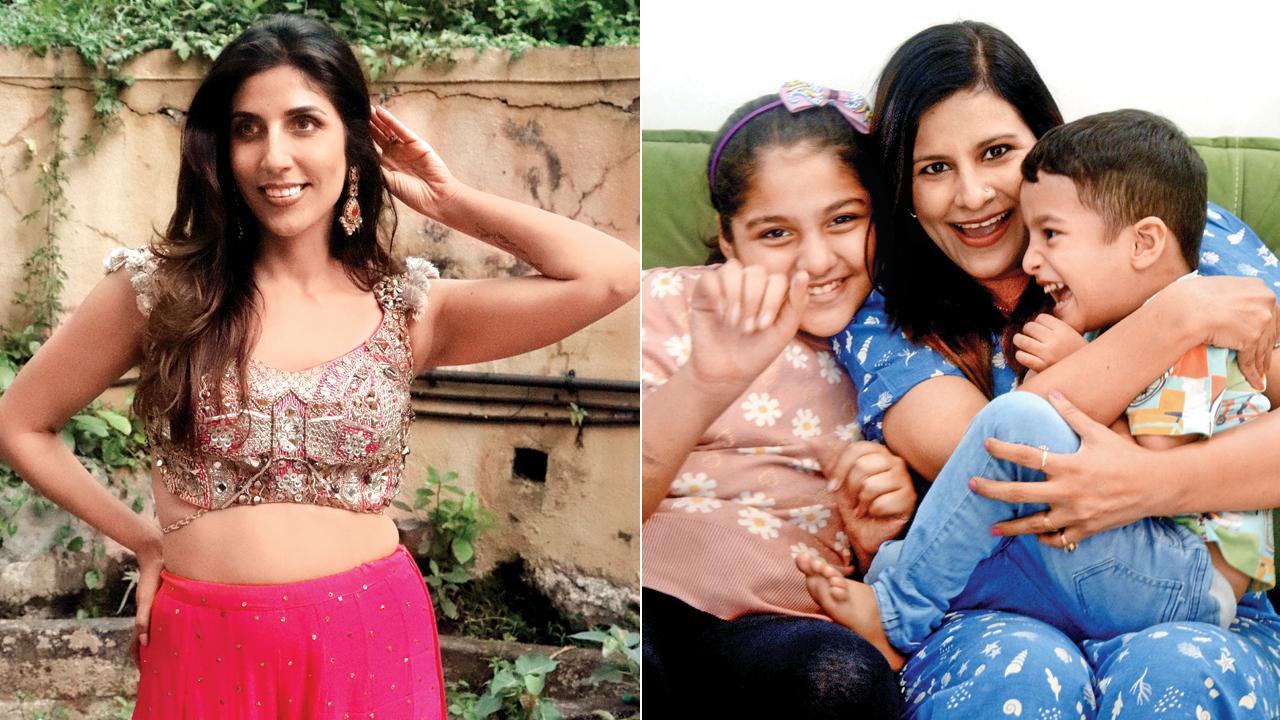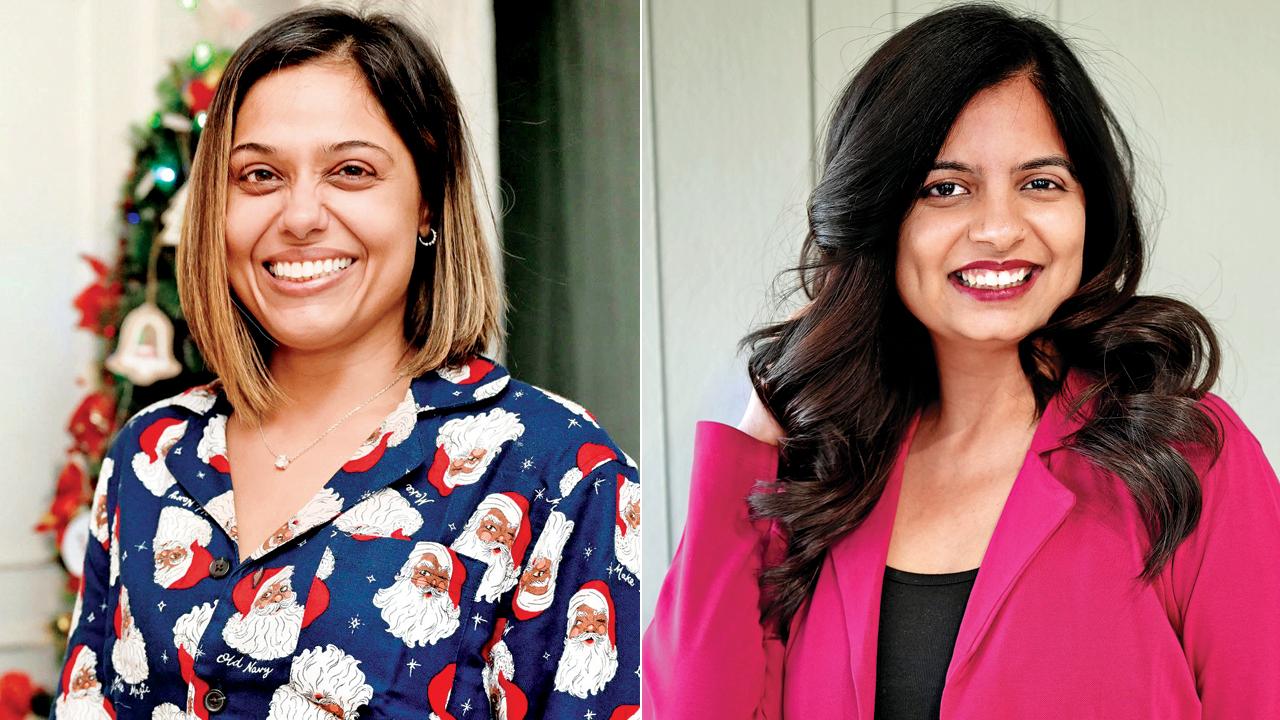Having gone from sharing their parental journey to becoming sought after content creators, momfluencers talk to mid-day about who really deserves the tag

Simone Khambatta was the first mom blogger to speak out about the mom blogger nominations, which sparked the entire debate. Pic/Anurag Ahire; (right) Snehalata Jain, who has been a mom blogger for the past 11 years, says that it will take much more than an award to get the recognition for mom bloggers and the work they put in. Pic/Sayyed Sameer Abedi
Last week, the news of an award nomination by a leading women’s magazine had mom blogger circles buzzing with indignation. The award nominations in question were for Mom Blogger of The Year, and the three finalists, it was argued, were not strictly mom influencers; they were just influencers who happened to have recently birthed children. The social media chatter eventually made its way to the ears of the organisers, who re-opened the nominations for the category and deleted its original post lauding the former finalists, which had raked in over 1,000 comments.
ADVERTISEMENT
Simone Khambatta claps her hands in glee when we tell her this. “If something matters, it must be spoken about,” the digital creator emphasises. “We’ve been asking for a mom blogger category for the past three years.” It was her stories and a reel posted on the topic that made the other mom bloggers rally around and comment their way to a new nomination round.
But how important is a nomination, anyway? The answer, believes Khambatta, lies in who has the right to identify as a mom blogger. “Because we’re mothers, anything we do—whether it’s fashion, or beauty, or skincare—isn’t given value, because ‘she’s a mother.’ At least let us be a momfluencer!”
Khambatta says.
 Pooja Khanna and Sonia Kotak
Pooja Khanna and Sonia Kotak
Once a woman becomes a mother, that becomes her primary identity, or at least, that’s the way Indian society classifies her. “Essentially, your life is over,” Khambatta says. “Post a reel about enjoying a friend’s party or dressing up, and Indian men will be all over your comments, asking ‘baccha hi kyu paida kiya?’” Her aim, she says, is to empower other moms to come into their own and embrace the multiple facets of their identity—which is why the award matters. “And it’s also unfair to categorise someone as a mom blogger who might not want that tag in the first place.”
In India, the growth of mom bloggers was slow but steady. The biggest spike happened during the pandemic, when everyone was at home and everything went online. Six years ago, when Khambatta began talking about her personal journey of being a mother, there were just 15 to 20 creators. Now, she says, there are thousands.
It would surprise many to know the extent of influence moms have garnered on social media over the past six to seven years. “That’s because they are the actual decision-makers in the home,” says Sonia Kotak, a Gujarat-based momfluencer. The kind of lobbying that took place was necessary, she feels, to highlight who’s an actual mom blogger—someone who shares their parenting journey, along with its challenges and highlights, and not just pictures of their kids every now and then.
Snehalata Jain, who has been writing about parenting and travel blogging on Instagram since 2012, feels that mom blogging is more about the information and advice one provides, rather than just ‘content’. It’s all about helping new mothers and parents and not just viral content that justifies the tag of a ‘mom blogger’,” is her take. “There is a difference between a mom blogger and being a mom influencer on Instagram,” is how she puts it.
Pooja Khanna, who started her Instagram page in 2017 to celebrate the beauty of having a special-needs child, adds that the subtleties of who is a mom blogger are apparent. “For me, it’s about the day- to-day life of being a mom, the ups and downs of raising a child with special needs.”
But while the competition in the momfluencer segment may seem intense on the face of it, the reality is surprising: it’s more collaborative than it is competitive. “The good thing about the mom community is that they co-create. We see so many mom bloggers coming together for collaborations. The reason why they have grown is because they have grown together,” says Tejal Daftary, the founder of PR agency Alphabet Media.
Herself a mother to a five-year-old daughter, Daftary says that for the layperson, who has a family and children, knowing what clothes are kid-friendly or tips for travelling with your kids is more important than knowing the latest brand of luxury products, which is why a large portion of Indian consumers gravitate towards mom bloggers.
Fashion, beauty, ed-tech, health, nutrition, medical, education—across all industries, mom influencers are being sought out; as per recent estimates by marketing agency DigiMaze, the momfluencer segment makes up 10.7 per cent of the Indian influencer pie, second only to the US.
And then there’s the fact that mom bloggers are incredibly honest about their parenting journeys, whether it’s talking about postpartum depression, which Kotak did, or celebrating the differences that a special-needs child has, in the case of Khanna. “Brands recognise that successful partnerships go beyond numbers; they seek authenticity, empathy, and a true connection with the audience,” says Mihir Surana, CEO of Nofiltr.Group, a social media label that seeks to incubate emerging talent.
Khambatta tells us that almost every national and international brand wants to work with mom bloggers, not just from metros but also Tier-II and Tier-III cities. “They’ve been able to earn money and feel empowered. Those with 50,000 to one lakh followers are easily earning anything between R20,000 to R50,000 per reel. And the best part? The vast majority of mom bloggers have a female audience; 70 per cent of their audience demographic is female,” she reveals.
On a pensive note, though, Jain, who was one of the first to comment on the nominations post, says that winning came at a cost. “After fighting so much for the nominations, it doesn’t feel good, as the brand didn’t acknowledge mom influencers in the first place.” It took her a month to gather votes after reaching out to her network.
But in general, the moms are celebrating this win, which Khambatta says is “historic”. “I think moms are a real scary bunch,” she laughs. “Just being a mom makes you strong and capable of doing anything. I’m looking forward to what happens next.”
 Subscribe today by clicking the link and stay updated with the latest news!" Click here!
Subscribe today by clicking the link and stay updated with the latest news!" Click here!







